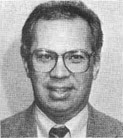|

|
SURFING THE NET
FOR THE RIGHT WAVE
By WILLIAM T. SUNLEY, Engineer of Local Roads and Streets
Credits to: Mark Blankenship, Local Program Data Management
Unit Chief.
|
The Internet may be the greatest thing since the
television, but it's also completely confusing. You know
there's valuable information out there. The question
is, how do you find it? The problem with searching for
information on the Internet is twofold. First, there's
too much of it. You've got the World Wide Web (the interconnected system of sites and their pages - over 7
million at last count - that you access with a browser
like Mosaic or Netscape Navigator), Gopher and FTP
(File Transfer Protocol) sites for finding and downloading files, and thousands of subject-specific news-groups and mailing lists. Second, all this information
is very unorganized: There's no centralized catalog, no
single place you can go to find what you need. In this
article we will try to help you gain a sense of direction
while surfing the Net.
Directories: A Directory is great if you're simply
interested in a general topic such as the Civil War, or
finance, and want to find some relevant spots on the
Net. Directories contain lists of such sites, organized
by topic. There are eleven main directory pages. One
of the most recent and best is Yahoo (http://www.yahoo.com/). It lists some 80,000 Net sites divided
among 14 top-level categories (Arts, Computers,
Health, etc.). Click on one and you get a list of
subtopics.
In addition to general-interest directories like
Yahoo, subject-specific directories cover everything
from Antiques to Youth Workers. The best way to find
one of these specialized directories is to check the
Clearinghouse for Subject-Oriented Internet Resource
Guides at the University of Michigan
(http://www.lib.umich.edu/chhome.html).
Search Engines: While directories are helpful
when trying to find out what the Web has to offer, they
become less so as your questions become more specific. To find answers to such questions, you need a
search engine. Search engines are Web pages containing forms into which you type a text string you want to
search for. Click a button, and the engine will present
a list of Web sites that match your search criteria. In a
recent issue of PC magazine, there were a reported 60
such pages, 10 of which were considered useful; the
rest were deemed too technical for the average user.
Behind every search engine is a database, in which
are collected the URLs (Universal Resource Locators,
or specially formatted Internet addresses) of Web
pages and other Net resources. Most of these databases are created by Crawlers (also known as robots or
spiders), software programs that roam the Web, looking for new sites by following links from page to page.
When a spider finds a new page, it adds it to the database. These databases store anywhere from a few thousand to over a million Web pages. Of the major general-interest engines, Alta Vista, Lycos and Excite have
the broadest coverage - with 21, 1.5, and 1.5 million
fully indexed Web pages respectively - followed closely by Open Text Index (a company which is looking to
merge with Yahoo) with 1.3 million.
The size of an engine's database has a big impact
on the success of your search. In a recent PC magazine
article, the massive Lycos database revealed 437 hits
(matched pages), InfoSeek and Open Text Index revealed about 200 each, others less than 100. But no
matter how big the database or how sophisticated the
indexing, a search engine is only as good as the query
you give it.
Sometimes it's just a matter of phrasing. For example, if you're looking for fly-fishing, try using variations like "flyfishing," and "fly fishing." Remember synonyms - to search on backpacking sights, you might include the terms "hiking," "trekking," "backpacking,"
and "camping" in the query. After the first pass, go to
some of the hits that look the most promising and jot
down other terms that you can use to sharpen or
widen the search.
Forget natural language. Some sites support natural language queries, which let you ask your concept,
August 1996 / Illinois Municipal Review / Page 25
then enter them as a list. Some engines even allow
Boolean Operators (decision making terms such as
AND, OR, NOT, etc.) which lets you exclude terms.
For example, with a search like "metal NOT heavy
NOT music" you can hit sites dealing with industrial
metals and avoid those devoted to heavy metal bands.
Metasearching: If you don't feel like hopping
from one search engine to another to find what you
want then check out a metasearch site. These are pages
from which you can use several search engines to
launch queries. The only problem with these parallel
searchers is that you don't get full access to each engine's query tools - the Boolean and proximity operators for example - so your searches will be less accurate than if you used each one individually.
Specialized Sites: If you're looking for a specific
company's Web page, try the Open Market's Commercial Sites Index (http://www.directory.net/). Similarly, if you're looking for government sponsored Web
sites, look at Infomine (http://lib-www.ucr.edu/
main.html). For Usenet news-groups use InfoSeek or
DejaNews (http://www.dejanews.com/). For downloadable files use ArchiePlex (http://flosun.salk.
edu/archieplex.html).
So, which tools yield the most pertinent information with the greatest ease of use? There are actually
four search engines which can prove to be beneficial - Alta Vista, Excite, Infoseek, and Lycos. As for the directories, Yahoo seems to be the most complete and
makes an excellent default home page. •
Page 26 / Illinois Municipal Review / August 1996
|